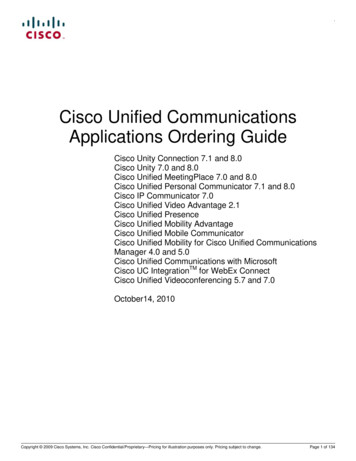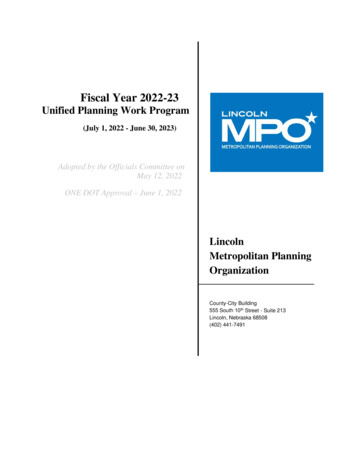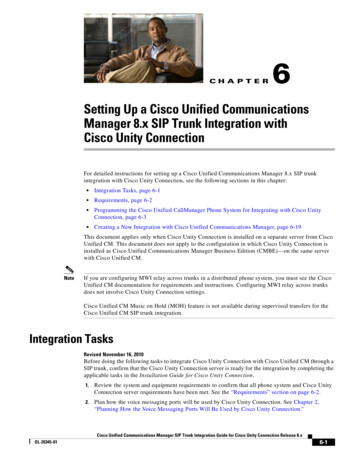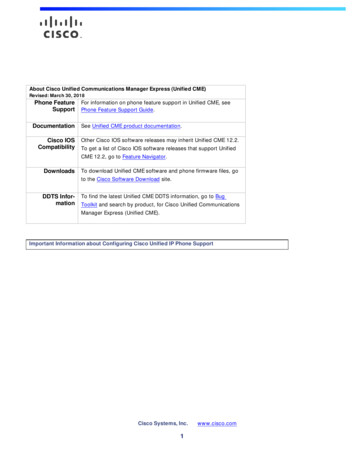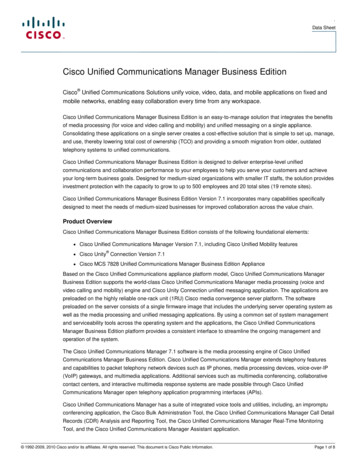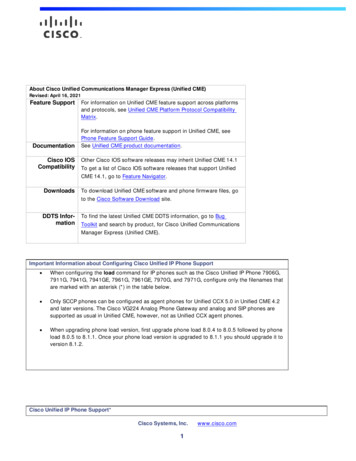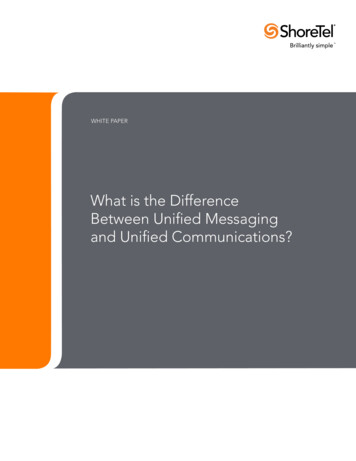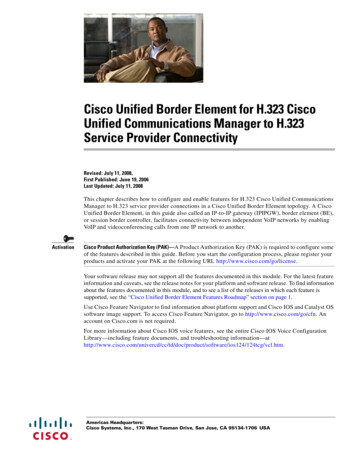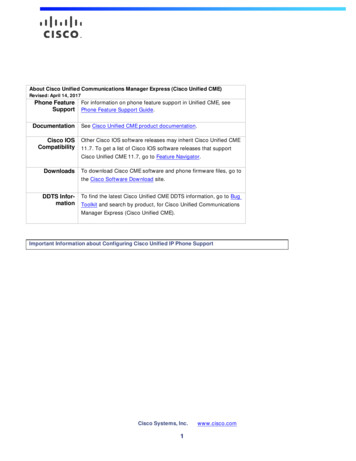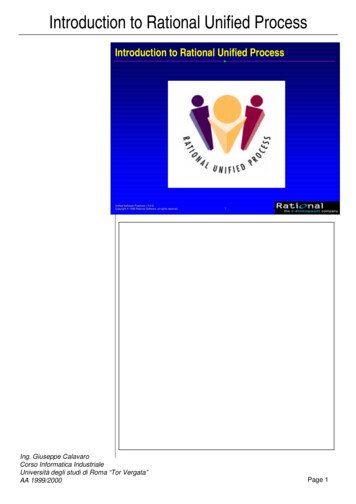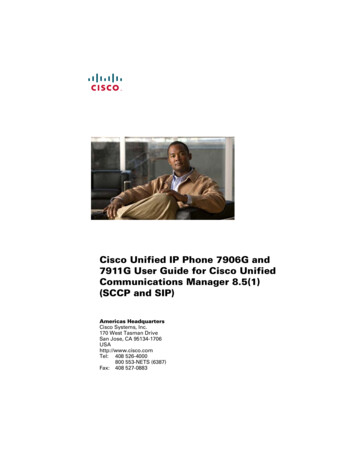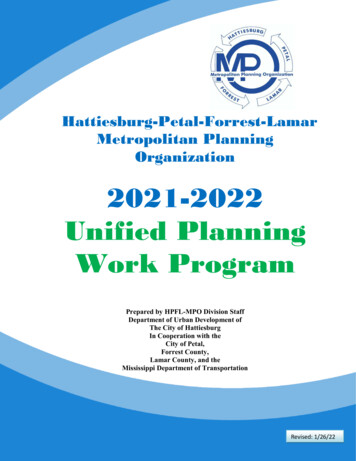
Transcription
Hattiesburg-Petal-Forrest-LamarMetropolitan PlanningOrganization2021-2022Unified PlanningWork ProgramPrepared by HPFL-MPO Division StaffDepartment of Urban Development ofThe City of HattiesburgIn Cooperation with theCity of Petal,Forrest County,Lamar County, and theMississippi Department of TransportationRevised: 1/26/22
ASSURANCE OF NON-DISCRIMINATIONThe Hattiesburg-Petal-Forrest Lamar Metropolitan Planning Organization, a recipient of federal funds through the Federal HighwayAdministration and the Federal Transit Administration, does not discriminate in its program, activities, or employment policies and proceduresagainst qualified individuals because of race, sex, religion, age, national origin, or handicapSection 601 of the Title VI of the Civil Rights Act of 1964 states:No person in the United States shall, on the grounds of race, color, or national origin, be excluded from the participation in, be denied thebenefits of, or be subjected to discrimination under any program or activity receiving Federal assistance2
Hattiesburg-Petal-Forrest-Lamar Metropolitan Planning OrganizationTable of ContentsIntroductionPage 5Purpose of the Unified Planning Work ProgramPage 5OrganizationPage 8Planning Issues and EmphasisPage 10Financial SummaryPage 12Unified Planning Work Program TasksPage 14Task 1.0Task 2.0Task 3.0Task 4.0Task 5.0Task 6.0Administrative/ManagementData Development & MaintenancePlanningMetropolitan Transportation PlanSpecial StudiesPublic TransportationUPWP Amendment ProcessFiguresFigure 1Figure 2Figure 3Figure 4Page 15Page 19Page 21Page 23Page 24Page 26Page 29Urbanized Area MapMPO Organization ChartTask ScheduleCommittee Member List4
IntroductionIntroductionEvery metropolitan area with a Census designated urbanized area population of more than 50,000persons must have a designated Metropolitan Planning Organization (MPO) to qualify for federalhighway or federal transit assistance. In 1980, the Hattiesburg Urbanized Area population reached over50,000, at which time the Metropolitan Planning Organization was designated by the Governor ofMississippi.The United States Department of Transportation (USDOT) relies on the MPO to ensure that highway,bicycle, pedestrian, and transit projects using federal funds are products of a continuing, cooperativeand comprehensive planning process. The federal and state governments provide funding supportthrough the Mississippi Department of Transportation (MDOT), the Federal Highway Administration(FHWA), the Federal Transit Administration (FTA). The planning efforts are performed and fundedthrough the City of Hattiesburg’s Department of Urban Development which serves as the designatedadministrator of the Hattiesburg-Petal-Forrest-Lamar Metropolitan Planning Organization (HPFL-MPO).Purpose of the Unified Planning Work ProgramThe Unified Planning Work Program (UPWP) is reviewed and approved by the Policy Committee of theHattiesburg-Petal-Forrest-Lamar Metropolitan Planning Organization (HPFL-MPO). Pursuant to currenttransportation legislation, the HPFL-MPO’s 2021-2022 UPWP identifies all transportation and relatedplanning activities that will be undertaken by the HPFL-MPO during the next two fiscal years fromOctober 1, 2020 to September 30, 2022. The UPWP helps to assure that planning resources are allocatedaccording to regional needs as identified by the City of Hattiesburg, the City of Petal, Forrest County,Lamar County, and the Mississippi Department of Transportation (MDOT).Legislative GuidanceThe 2021-2022 UPWP was developed in accordance with regulations set forth in the Fixing America’sSurface Transportation (FAST) Act, adopted December 4, 2015. The MPO is responsible, together withthe State of Mississippi, for carrying out the provisions of FAST Act under Title 23, United States Code,Section 134 (The Urban Transportation Planning Process), and further regulated by Title 23 Code ofFederal Regulations 420 and 450.The Scope of the Metropolitan Planning Process must include the following transportation planningfactors: Support the economic vitality of the United States, the States, metropolitan areas, andnonmetropolitan areas, especially by enabling global competitiveness, productivity, andefficiency;Increase the safety of the transportation system for motorized and non-motorized users;Increase the security of the transportation system for motorized and non-motorized users;Increase the accessibility and mobility of people and freight;5
Protect and enhance the environment, promote energy conservation, improve the quality oflife, and promote consistency between transportation improvements and State and localplanned growth and economic development patterns;Enhance the integration and connectivity of the transportation system, across and betweenmodes throughout the State, for people and freight;Promote efficient system management and operation; andEmphasize the preservation of the existing transportation system.The FAST Act expands the scope of consideration of the metropolitan planning process to include: Improving transportation system resiliency and reliability;Reducing (or mitigating) the stormwater impacts of surface transportation; andEnhancing travel and tourism. [23 U.S.C. 134(h)(1)(I) & (J)]The tabled “Scope of the Metropolitan Planning Process” below shows how the Planning Tasks relate toeach of the planning factors and FAST Act expansions listed above.SCOPE OF THE METROPOLITAN PLANNING intenance& AnalysisShort-RangePlanningLong-RangePlanningAir Quality &CongestionManagementPlanningEconomic Metropolitan Planning Factors Safety Security Mobility Options Conserve EnvironmentEnergyMulti-ModalIntegrationOperations &Management Preserve Existing System PublicParticipationRegionalPublicTransitPlanning FAST Act Expansion of Scope of Metropolitan Planning ProcessResiliency & Reliability Stormwater Impacts Travel & Tourism In compliance with the FAST Act the HPFL-MPO will identify, evaluate, and select performance measures to beutilized in the transportation planning process. National performance goals and measures identified by federal andstate transportation agencies will be considered and utilized as required. Additional performance measures maybe selected for use at the local level in determining the needs of the transportation system in an effort to improvethe overall system performance within the HPFL-MPO planning area.6
Public InvolvementPublic involvement is conducted in accordance with the adopted Public Participation Plan. Staff sendsnotification of all Technical Committee and Policy Committee meetings, Transportation ImprovementProgram (TIP), or Metropolitan Transportation Plan (MTP) meetings to a mailing (email) list comprised ofcitizens, businesses, federal, state, and local agencies related to or interested in transportation planning.Meeting notices are posted on the HPFL-MPO website and advertised in the local newspaper.Definition of AreaThe Metropolitan Planning Area (MPA) of the HPFL-MPO consist of the jurisdictional boundary of theCity of Hattiesburg, the City of Petal, a portion of Forrest and Lamar counties as depicted in Figure 1.Figure 17
OrganizationOrganizationThe HPFL-MPO Policy Committee is the governing and final decision-making body for the organization. Itis comprised of the Mayors of the City of Hattiesburg and City of Petal, Presidents of the Forrest Countyand Lamar County Board of Supervisors or their designees, Executive Directors of the MississippiDepartment of Transportation Federal Highway Administration and the Federal Transit Administrationand the Executive Director of the MPO.The HPFL-MPO Technical Committee (TC) is responsible for advising the Policy Committee on all urbantransportation planning matters and to help guide the metropolitan transportation planning process.Additionally, this committee advises on issues of a technical nature and provides recommendations onHPFL-MPO policy issues. The TC is comprised of engineers, planners, technicians, city/county full-timestaff and consultants, and staff of state and federal transportation agencies. A current list of PolicyCommittee and Technical Committee members is provided in Figure 2. Individuals are typically membersby virtue of their role with an agency, organization or jurisdiction, which may change as entities experiencestaff turnover.The MPO Staff and the Technical Committee assist MPO board with planning and recommendations. TheHPFL-MPO currently operates with the following staff positions: Executive Director, MPO DivisionManager, MPO Administrative Assistant, MPO Transit Specialist and the MPO Transportation Planner.
Figure 2HPFL-MPOPolicy CommitteeHPFL-MPOInterim DirectorHPFL-MPO k JonesJennifer ShowsHPFL-MPO DivisionManagerArmendia EstersHPFL-MPOAdministrative AssistantDeanna ChapmanHPFL-MPO TransitSpecialistAs a small organization, the HPFL-MPO’s effectiveness also depends on its ability to form collaborativepartnerships with a variety of stakeholders, including community groups, health care professionals,school/college administrators, utility companies, the Chamber of Commerce, and economicdevelopment groups on programs, projects and initiatives.
Planning Issues & EmphasisPlanning Issues & EmphasisEmphasis for the 2021 and 2022 fiscal years will include the following:2045 Metropolitan Transportation Plan (MTP)An important element of the current UPWP is maintenance of the 2040 MTP. This long-range planfocuses on developing a multimodal transportation system and serves as the guide to decision-makingfor the Policy Committee. Developing and implementing Performance-Based Planning, completion ofdata collection, data analysis, and system evaluation using the travel demand model, public outreachand technical writing will be done, for maintenance of the 2015-2040 MTP and in preparation for theupdate to the 2020-2045 MTP.Transportation Improvement Program (TIP)The TIP is a four-year, fiscally constrained program that identifies which federally funded projects will beimplemented. The TIP must be consistent with HPFL-MPO’s adopted Metropolitan Transportation Plan(MTP). The 2021-2024 TIP will be developed, monitored and amended as necessary in compliance withfederal regulations.Public ParticipationImprove public participation; utilize visualization tools to engage the public’s interest; engage thetraditionally underserved populations, using radio, interpreters or non-mainstream news sources;remain compliant with state and federal regulations for the Open Meetings Act, Americans withDisabilities Act (ADA), Title VI/Environmental Justice issues, Disadvantaged Business Enterprise (DBEProgram) and Limited English Proficiency Plan (LEP).Transportation Model & GIS DevelopmentWork will include data collection, defining networks and zones, expanded GIS capabilities, and otheractivities needed to keep the transportation model updated for the MTP and other transportationanalyses.Comprehensive Traffic Count and Studies ClearinghouseTraffic Count data collection and mapping database development, traffic study data collection and webbased clearinghouse development and web maintenance.SafetyThe HPFL-MPO will make every effort to support member agencies as they integrate safetyconsiderations in all planning levels. This planning will include all modes of transportation, therebydeveloping a safe network for all travelers.SecurityThe HPFL-MPO will make every effort to support member agencies as they integrate securityconsiderations in all planning levels. This planning will include all modes of transportation, therebydeveloping a secure network for all users.10
Community MobilityContinue work in expanding public transit and all alternative modes. Complete a route and transitmaster plan and implement accordingly. The goal is to create a seamless network that increases theconnectivity and accessibility of local facilities making non-motorized modes more convenient and saferand improving the efficiency and cost effectiveness of public transit.Public TransportationProvide public transportation planning, data, and management support for public transit.11
Financial SummaryThe estimated funding available to the HPFL-MPO for 2021 and 2022, respectively, totals 1,739,388.00in federal, state, and local funds. The Federal and Local funding will be available over the two year period.Please be aware that funding estimates are based upon prior years’ authorizations; approvals are madecontingent upon legislation for continued funding.The Unified Planning Work Program currently addressed planning funds administered by the U.S.Department of Transportation under three programs.Federal Highway Administration Planning Funds (PL-Funds)Federal Transit Administration Flex Funding Program (5305 Funds)PL carryover funds have been reduced by paid invoices and pending invoices The Mississippi Department of Transportation provides a share of the non-federal matched for the FlexFund programs. The City of Hattiesburg provides local monies and in-kind services for PL-funds and transitfunds.Carryover 589,942.005305 FLEXFunds 210,519.00FY2021 234,040.00 58,559.00 14,640.00 58,510.00 365,749.00FY 2022 238,721.00 59,730.00 14,932.00 59,680.00 373,063.00Total 1,062,703.00 328,808.00 82,202.00 265,675.00ITEMPL FundsTaskPLMDOT MatchLocal MatchTOTAL 52,630.00 147,485.00 1,000,576.005305 FLEXMDOT Match Local Match1,739,388.00Total1 340,515.00 201,100.00 50,275.00 85,129.00 677,019.002 173,780.00 68,369.00 17,091.00 43,445.00 302,685.003 157,853.00 - - 39,464.00 197,317.004 27,575.00 - - 6,894.00 34,469.005 362,980.00 - 90,745.00 453,725.006 - 59,339.00 14,834.00 74,173.00TOTAL 1,062,703.00 328,808.00 82,200.00 - 265,677.00 *The financial source for this item will be provided by the CARES Act, and will not include PL funds.121,739,388.00
FY 2021-2022 UNIFIED PLANNING WORK PROGRAM nds MDOT 5305Flex Funds340,515.00 MDOTMatch201,100.00 LOCAL/inkind50,275.00 85,129.00Program AdministrationCommittee SupportStaff Travel and TrainingInteragency CoordinationPublic ParticipationData Development 253,900.00 201,100.00 37,121.00 - 19,797.00 - 12,374.00 17,323.00 Transportation Data CollectionTechnical AssistanceTrainingPlanning 101,780.00 43,369.00 10,841.00 25,445.00 52,000.00 25,000.00 6,250.00 13,000.00 20,000.00 - 5,000.00Manage Program Documents 102,682.00 - - 25,671.00Coordination with Transit ServiceProviders 55,171.00 - - 13,793.00 173,780.00 63,475.00- 9,280.00 - 4,949.00- - 3,094.00- - 4,331.00 68,369.0050,275.00 17,091.00 43,445.00 157,853.00 39,464.00 27,575.00Metropolitan Transportation Plan(MTP) Management and Planning Special Studies 6,894.0027,575.00 - - 362,980.00 - - -Drainage Study relative to potential futureprojectPavement Management Planning 132,980.00 - - - - -Active Transportation Master PlanBlue Ways & Pathways Appendix 230,000.00 -Public Transportation 59,339.00 6,894.00 90,745.00Major Corridor StudiesMPO Transit SpecialistRegional Transit Planning Study - 34,339.0025,000.00 33,245.0057,500.00 14,834.00 8,584.006,250.00 -
Unified Planning Work Program Tasks14
TASK 1.0 - ADMINISTRATION/MANAGEMENTResponsible Party and Contact Information:Andrew EllardUrban Development ECTIVEThe objective of Task 1.0 is to ensure that the metropolitan transportation planning process is acontinuing, comprehensive and coordinated (3C), regional transportation planning program conductedin compliance with applicable federal, state, and local laws and regulations in order to address thetransportation needs within the Metropolitan Planning Boundary and ensure that all modes oftransportation are considered as viable elements in the overall planning process.POLICY PURPOSE: The MPO will maintain offices and staff for the purpose of administration operationsof the MPO. The MPO administrative staff will maintain fiscal accountability in accordance with federalregulations for grant administration, including the in-kind program; project managers will monitor staffand/or consultant performance on work assignments as required accomplishing UPWP tasksEXPECTED PRODUCTSExpected products from this task include the implementation of the metropolitan transportation planningprocess through: Program Administration/Management; Committee Support; Travel and Training; Interagency Coordination; and Public ParticipationSUBTASKS1.1 Program AdministrationAdminister the program by: Accomplishing planning objectives and ensuring compliance with applicable federal, state, andlocal laws and regulations Carrying out accounting and records management Providing office space for HPFL-MPO staff. Managing HPFL-MPO staff, including assignment oftasks, oversight of responsibilities, performance evaluations, and administration of employees’ leave; Implementing, maintaining and updating policy documents including the HPFL-MPO Bylaws, the Public Participation Plan and the Limited English Proficiency Plan; Developing and managing contracts necessary for carrying out the program; Participation in the Association of Metropolitan Planning Organizations (AMPO), and otherorganizations that enhance the planning process; and Monitor federal and state legislation related to or impacting transportation issues.15
1.2 Committee SupportProvide support to the Policy Committee (PC), Technical Committee (TC) and other designatedsubcommittees by: Preparing and distributing meeting schedules; Securing meeting locations and coordinating room arrangements; Advertising and posting meeting notices in accordance with the Public Participation Plan; Preparing and delivering committee packets and supporting information; Preparing resolutions supporting planning projects from member agencies; and Provide meeting minutes or notes, as appropriate, to committee members.1.3 Staff Travel and TrainingAttend workshops, conferences, seminars, webinars and other events that support the work of the HPFLMPO and further enhance staff knowledge, skills and abilities. Attendance at the following is anticipated,subject to prior approval from MDOT for all out-of-state travel: FHWA and MDOT Training Sessions MDOT Statewide MPO’s Executive Committee, Subcommittee and Membership Meetings Association of MPO’s (AMPO) Annual Conference ESRI National Conference Transportation Research Board (TRB) Innovations in Travel Modeling National Training Institute Training (NTI) Mississippi Automated Resource Information System (M.A.R.I.S.) Forums MDOT Statewide Transit Summit1.4 Interagency CoordinationCoordinate with agencies and community groups on transportation-related issues within the HPFL-MPOplanning area.These groups include, but are not limited to: MDOT State and District VI Area Development Partnership City of Hattiesburg Southern Mississippi Planning and Development City of PetalDistrict Forrest County Hattiesburg Convention & Visitors Bureau Lamar County Hattiesburg Downtown University of Southern Mississippi Medical Centers William Carey University Social Service Agencies Hattiesburg Laurel Regional Airport Bicycling Advocacy Groups Railroad Agencies Forrest County Industrial Park Commission Bobby Chain Municipal Airport16
1.5 Public ParticipationThe HPFL-MPO will engage the public in accordance with the Public Participation Plan (3P) and will meetthe requirements of U.S. Title I of the Civil Rights Act of 1964 by: Conducting appropriate public hearings, public meetings and community outreach activities; Maintaining a database of media contacts for dissemination of public participation materials andnotices; Producing and distributing a quarterly newsletter; Extending HPFL-MPO’s outreach using the HPFL-MPO website, surveys, electronic newsletters,visualization tools and appropriate innovative participation techniques; Complying with the FTA/MDOT directive to maintain a Limited English Proficiency Program(LEP), wherein information and documents will be made available to the public in otherlanguages upon request, to facilitate participation in HPFL-MPO plans, programs and activities;and Attending and participating in local meetings addressing transportation issues or issues thatimpact transportation concerns.17
Previous Work MPO Administration and ManagementUnified Planning Work Program (UPWP)Quarterly Transportation Policy Committee (TPC) and Technical Coordinating Committee (TCC) meetingsMPO self-certification reviewMaintain interagency agreementsMPO Planning and Technical SupportTransportation Improvement Program (TIP)Professional Development for MPO Staff and MPO MembersFunctional Roadway ClassificationsSupervision of staff assigned to Transportation Planning and MPO tasksParticipation and coordination of federal and state programsMemorandum of Understanding between HPFL-MPO and MDOTInvoice, Budget and Quarterly ReportsParticipate in federal and state meetingsAnnual AuditTASK 1.0 - ADMINISTRATION/MANAGEMENTTask1PL 340,515.005305 201,100.00MDOT Match 50,275.00Local Match 85,129.00Total 677,019.0018
TASK 2.0 - DATA DEVELOPMENT & MAINTENANCEResponsible Party and Contact Information:Andrew EllardUrban Development Department601-545-4609aellard@hattiesburgms.comThe objective of Task 2.0 is to collect, update, analyze, model and maintain the basic data, inventories andtools necessary for use in implementing the HPFL-MPO transportation plans, programs and projects.Private sector professional services may be utilized in order to supplement staff efforts under this task.EXPECTED PRODUCTSExpected products from this task include: Collection, analysis, and maintenance of transportation data; Maintain and update databases and inventories of transportation data and facilities; Maintain and update the travel demand model; Maintain and update the Geographic Information System (GIS).PREVIOUS WORK Provision of land use, socioeconomic, population data to be used by communities in long rangetransportation planningProvision of maps, traffic counts, inventory data and other technical informationContinuous monitoring and surveillance of growth patterns and other factors (such assubdivision development) for effect on transportationCoordination of transportation planning processTechnical assistance, including maps traffic statistics and planning dataSUBTASKS2.1 Transportation Data Collection and AnalysisHPFL-MPO staff, in cooperation with member agencies, will develop, analyze, update and maintain datarelative to the transportation system. Socioeconomic data, transportation data, information services,travel demand modeling and analytical support will be developed and utilized in carrying out thetransportation planning process, to the extent that resources allow, by: Collecting and maintaining population, employment, land use, and socio-economic data;Developing and maintaining maps and inventories of transportation system components;Collecting, updating and maintaining Geographic Information System (GIS) data for use in dataretrieval, analysis, projections, mapping and the presentation of transportation planningproducts and activities in support of public participation and environmental justice programs;Establish an annual program for collecting traffic volume and turning movement counts.19
2.2 Technical Assistance, including Maps, Traffic Statistics and Planning DataTo provide technical assistance to the MPO entities in transportation planning and coordination of MPOplans, activities and policies in order to promote overall cooperation, long/short term planning andcapital. Train staff on the GIS/TMS system, Arc View and TRANSCAD software. Provision of current land use, population, socioeconomic data. General monitoring and surveillance to assure the metropolitan urbanized area is in compliancewith current land use, planning and transportation plans. Maintain current and accessible inventory of land use, zoning changes, traffic counts andadditional planning data for transportation planning purposes. Update zoning maps with changes. Obtain digital aerial photography in order to verify land use by consulting current aerialphotography and conducting field checks. Provide other technical assistance as requested. This assistance will include many functionsrequired for proper daily operations of the MPO. This will include items such as surveying,researching legal documents, traffic counting, TMS/GIS maintenance, software updating andpersonnel scheduling. Purchase of GIS equipment and software for upgrade and implementing TransportationManagement System (TMS). Purchase of capital equipment for transit system, including bus tracking and computerequipment and onboard data gathering equipment. Technical assistance in implementing tracking program for transit system.2.3 TrainingDevelop a training program to continually monitor, evaluate and identify priority projects and fundingsources for projects to improve all components of transportation including safety and mobility.Continue MPO agency staff professional growth through participation in training courses, seminars andworkshops that promote the 3C planning process and overall administrative techniques for continuationof MPO activities. Continue staff training on the GIS/TMS system, Arc View and TRANSCAD software Provide training for MPO members Staff training for transportation initiatives. (FTA, MPO, Federal and State)TASK 2.0 – DATA DEVELOPMENT & MAINTENANCETask2PL 173,780.005305 68,369.00MDOT Match 17,091.00Local Match 43,445.00Total 302,686.0020
TASK 3.0 - PLANNINGResponsible Party and Contact Information:Andrew EllardUrban Development ECTIVEThe objective of Task 3.0 is to implement and maintain short-term transportation planning activitiesassociated with FY 2021-2022. To evaluate the existing transportation network and infrastructure interms of operational efficiency and development of alternative strategies for reducing congestion,improving safety, and enhancing the mobility of people and goods. The HPFL-MPO does anticipateutilizing private sector professional services in this work task.EXPECTED PRODUCTSProducts expected from this task include: Management of the FY 2021-2024 Transportation Improvement Program (TIP); Implementation the 2021-2022 Unified Planning Work Program (UPWP); Development of the 2023-2026 TIP: Development of the 2023-2024 UPWP; Development and submittal to MDOT, FHWA, and FTA of the Self-Certification Statements andthe Annual List of Projects (ALOP), as required; Coordination with transit service providers; and Monitoring the Regional Intelligent Transportation System (ITS) ArchitecturePREVIOUS WORK Develop and execute Unified Planning Work Program (UPWP) Develop and coordinate local Transportation Improvement Plan (TIP) Partnership and continued development of the Long Range Transportation Plan Conduct special studies (i.e. alternative truck route, corridor analysis, parking, access, etc.) Update of major thoroughfare plan Long-range planning, Short-range planning Develop and maintain project prioritization (construction) list21
SUBTASKS3.1 Manage Program Documents The following programmatic documents will be managed: Unified Planning Work Program (UPWP) - the 2021-2022 UPWP will be monitored and amendedas necessary and the 2023-2024 UPWP will be developed; Transportation Improvement Program (TIP) – the 2021-2024 TIP will be monitored andamended as necessary and the 2023-2026 TIP will be developed. Changes that impact projectsor available funding will be submitted to the HPFL-MPO staff by member agencies; Annual Listing of Obligated Projects (ALOP) – the 2017 ALOP and the 2018 ALOP will bedeveloped and made available to the public by posting on the HPFL-MPO website; and Self-Certification Statement – the Self-Certification Statement will be prepared and included inthe UPWP and the TIP documents (see Appendix F).3.2 Coordination with Transit Service ProvidersThe HPFL-MPO will coordinate with transit service providers, when requested and to the extent thatHPFL-MPO resources allow, by: Providing assistance with planning projects for public transportation services in underservedareas within the HPFL-MPO planning area; Participating in efforts to maintain the Coordinated Regional Public Transportation Plan; Providing assistance for city level planning analyses in support of Environmental Justice/Title VIrequirements to ensure compliance with FTA requirements; Participating in opportunities for transportation demand management; Participating in public education/awareness activities; and Supporting member agency applications for transit related grants and other funding sources.TASK 3.0 – PLANNINGTask3PL 157,853.005305 0.00MDOT Match 0.00Local Match 39,464.00Total 197,317.0022
TASK 4.0 - METROPOLITAN TRANSPORTATION PLANResponsible Party and Contact Information:Andrew EllardUrban Development ECTIVEThe objective of Task 4.0 is to implement, monitor and amend as necessary, the 2045 MetropolitanTransportation Plan (MTP) which identifies transportation needs for the region between 2020 and 2045.Section 134 (i)(2), U.S.C., as amended by MAP-21 and the FAST ACT, Atransportation plan --- shallcontain, at a minimum, the following: C (2)(E) FINANCIAL PLAN: (i) A financial plan that (I) demonstrateshow the adopted transportation plan can be implemented; (II) indicates resources from public andprivate sources that are reasonably expected to be made available to carry out the plan; and (III)recommends any additional financing strategies for needed projects and programs. (ii) The financial planmay include for illustrative purpo
Page 5 . Purpose of the Unified Planning Work Program Page 5 . Organization Page 8 . Planning Issues and Emphasis Page 10 Financial Summary Page 12 . . Meeting notices are posted on the HPFL-MPO website and advertised in the local newspaper. Definition of Area The Metropolitan Planning Area (MPA) of the HPFL-MPO consist of the jurisdictional .
